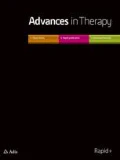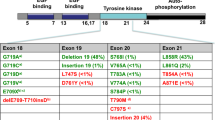Abstract
Epidermal growth factor receptor (EGFR)-activating mutations in non-small cell lung cancer (NSCLC) are molecular targets for treatment with gefitinib and erlotinib, often resulting in improved response and prolonged progression-free survival. Resistance to these drugs, which develops during treatment, is a problem of paramount importance. Several mechanisms of “acquired resistance” have been discovered and treatments for this specific entity are on the horizon.
Similar content being viewed by others
References
Tsao AS, Tang XM, Sabloff B, et al. Clinicopathologic characteristics of the EGFR gene mutation in non-small cell lung cancer. J Thorac Oncol. 2006;1:231–239.
Rosell R, Moran T, Queralt C, et al. Screening for epidermal growth factor receptor mutations in lung cancer. N Engl J Med. 2009;361:958–967.
Tanaka T, Matsuoka M, Sutani A, et al. Frequency of and variables associated with the EGFR mutation and its subtypes. Int J Cancer. 2010;126:651–655.
Mok TS, Wu YL, Thongprasert S, et al. Gefitinib or carboplatin-paclitaxel in pulmonary adenocarcinoma. N Engl J Med. 2009;361:947–957.
Maemondo M, Inoue A, Kobayashi K, et al. Gefitinib or chemotherapy for non-small-cell lung cancer with mutated EGFR. N Engl J Med. 2010;362:2380–2388.
Jackman D, Pao W, Riely GJ, et al. Clinical definition of acquired resistance to epidermal growth factor receptor tyrosine kinase inhibitors in non-small-cell lung cancer. J Clin Oncol. 2010;28:357–360.
Ciardiello F. Epidermal growth factor receptor inhibitors in cancer treatment. Future Oncol. 2005;1:221–234.
Lynch TJ, Bell DW, Sordella R, et al. Activating mutations in the epidermal growth factor receptor underlying responsiveness of non-small-cell lung cancer to gefitinib. N Engl J Med. 2004;350:2129–2139.
Mitsudomi T, Morita S, Yatabe Y, et al. Gefitinib versus cisplatin plus docetaxel in patients with non-small-cell lung cancer harbouring mutations of the epidermal growth factor receptor (WJTOG3405): an open label, randomised phase 3 trial. Lancet Oncol. 2010;11:121–128.
Zhou C, Wu Y-L, Chen G, et al. Efficacy results from the randomised phase III OPTIMAL (CTONG0802) study comparing first-line erlotinib versus carboplatin (CBDCA) plus gemcitabine (GEM), in Chinese advanced non-small cell lung cancer (NSCLC) with EGFR-activating mutations. Ann Oncol. 2010;21(suppl. 8). Abstract.
Paz-Ares L, Soulieres D, Melezinek I, et al. Clinical outcomes in non-small-cell lung cancer patients with EGFR mutations: pooled analysis. J Cell Mol Med. 2010;14:51–69.
Riely GJ, Pao W, Pham D, et al. Clinical course of patients with non-small cell lung cancer and epidermal growth factor receptor exon 19 and exon 21 mutations treated with gefitinib or erlotinib. Clin Cancer Res. 2006;12:839–844.
Reck M, Van ZN, Gridelli C, et al. Erlotinib in advanced non-small cell lung cancer: efficacy and safety findings of the global phase IV Tarceva Lung Cancer Survival Treatment study. J Thorac Oncol. 2010;5:1616–1622.
Heigener D, Gatzemeier U, Schneider CP, et al. Does the type of EGFR activating mutation impact outcomes with erlotinib treatment? Ann Oncol. 2010;21(suppl. 8). Abstract.
Nardi V, Azam M, Daley GQ. Mechanisms and implications of imatinib resistance mutations in BCR-ABL. Curr Opin Hematol. 2004;11:35–43.
Kobayashi S, Boggon TJ, Dayaram T, et al. EGFR mutation and resistance of non-small-cell lung cancer to gefitinib. N Engl J Med. 2005;352:786–792.
Suda K, Onozato R, Yatabe Y, et al. EGFR T790M mutation: a double role in lung cancer cell survival? J Thorac Oncol. 2009;4:1–4.
Onitsuka T, Uramoto H, Nose N, et al. Acquired resistance to gefitinib: the contribution of mechanisms other than the T790M, MET, and HGF status. Lung Cancer. 2010;68:198–203.
Oxnard GR, Riely GJ, Arcila MG, et al. Clinical course of patients (pts) with acquired resistance (AR) to EGFR tyrosine kinase inhibitors (TKI). J Clin Oncol. 2010;28(suppl.):15s. Abstract.
Park K, Heo DS, Cho D, et al. PF-00299804 (PF299) in Asian patients (pts) with non-small cell lung cancer (NSCLC) refractory to chemotherapy (CT) and erlotinib (E) or gefitinib (G): a phase (P) I/II study. J Clin Oncol. 2010;28(suppl.). Abstract.
Mok T, Spigel D, Park K, et al. Efficacy and safety of PF-00299804 (PF299), an oral, irreversible, pan-human epidermal growth factor receptor (pan-HER) tyrosine kinase inhibitor (TKI), as first-line treatment (tx) of selected patients (pts) with advanced (adv) non-small cell lung cancer (NSCLC). J Clin Oncol. 2010;28(suppl.). Abstract.
Yang CH, Shih JY, Su WP, et al. A phase II study of BIBW 2992 in patients with adenocarcinoma of the lung and activating EGFR mutations (LUXLung 2). J Clin Oncol. 2010;28(suppl.). Abstract.
Nishino M, Jackman DM, Hatabu H, et al. New response evaluation criteria in solid tumors (RECIST) guidelines for advanced non-small cell lung cancer: comparison with original RECIST and impact on assessment of tumor response to targeted therapy. AJR Am J Roentgenol. 2010;195:W221–W228.
Miller VA, Hirsh V, Cadranel J, et al. Phase IIB/III double-blind randomized trial of Afatinib (BIBW2992, irreversible inhibitor of EGFR/HER1 and HER2) + best supportive care versus placebo and BSC in patients failing 1–2 lines of chemotherapy and erlotinib or gefitinib (LUXLung 1). Ann Oncol. 2020;21(suppl. 8). Abstract.
Sequist LV, Besse B, Lynch TJ, et al. Neratinib, an irreversible pan-ErbB receptor tyrosine kinase inhibitor: results of a phase II trial in patients with advanced non-small-cell lung cancer. J Clin Oncol. 2010;28:3076–3083.
McDermott U, Settleman J. Personalized cancer therapy with selective kinase inhibitors: an emerging paradigm in medical oncology. J Clin Oncol. 2009;27:5650–5659.
Cipriani NA, Abidoye OO, Vokes E, et al. MET as a target for treatment of chest tumors. Lung Cancer. 2009;63:169–179.
Engelman JA, Zejnullahu K, Mitsudomi T, et al. MET amplification leads to gefitinib resistance in lung cancer by activating ERBB3 signaling. Science 2007;316:1039–1043.
Cappuzzo F, Marchetti A, Skokan M, et al. Increased MET gene copy number negatively affects survival of surgically resected non-small-cell lung cancer patients. J Clin Oncol. 2009;27:1667–1674.
Munshi N, Jeay S, Li Y, et al. ARQ197, a novel and selective inhibitor of the human c-Met receptor tyrosine kinase with antitumor activity. Mol Cancer Ther. 2010;9:1544–1553.
Schiller JH, Akerley WL, Brugger W, et al.: Results from ARQ197-209: a global randomized placebocontrolled phase II clinical trial of erlotinib plus ARQ197 versus erlotinib plus placebo in previously treated EGFR inhibitor-naive patients with locally advanced or metastatic non-small cell lung cancer (NSCLC). J Clin Oncol. 2010;28:15s. Abstract.
Spigel D, Ervin T, Ramlau R, et al. Randomised multicenter double-blind placebo controlled phase II study evaluating METMAB, an antibody to METreceptor in combination with erlotinib in patients with advanced non-small cell lung cancer. Ann Oncol. 2010;21(suppl. 18). Abstract.
Morgillo F, Kim WY, Kim ES, et al. Implication of the insulin-like growth factor-IR pathway in the resistance of non-small cell lung cancer cells to treatment with gefitinib. Clin Cancer Res. 2007;13:2795–2803.
Karp DD, Paz-Ares LG, Novello S, et al. Phase II study of the anti-insulin-like growth factor type 1 receptor antibody CP-751,871 in combination with paclitaxel and carboplatin in previously untreated, locally advanced, or metastatic non-small-cell lung cancer. J Clin Oncol. 2009;27:2516–2522.
Jassem J, Langer CJ, Karp DD, et al. Randomized, open label, phase III trial of figitumumab in combination with paclitaxel and carboplatin versus paclitaxel and carboplatin in patients with non-small cell lung cancer (NSCLC). J Clin Oncol 2010;28(suppl.). Abstract 7500.
Author information
Authors and Affiliations
Corresponding author
Rights and permissions
About this article
Cite this article
Heigener, D.F., Reck, M. Mutations in the epidermal growth factor receptor gene in non-small cell lung cancer: Impact on treatment beyond gefitinib and erlotinib. Adv Therapy 28, 126–133 (2011). https://doi.org/10.1007/s12325-010-0096-4
Received:
Published:
Issue Date:
DOI: https://doi.org/10.1007/s12325-010-0096-4




